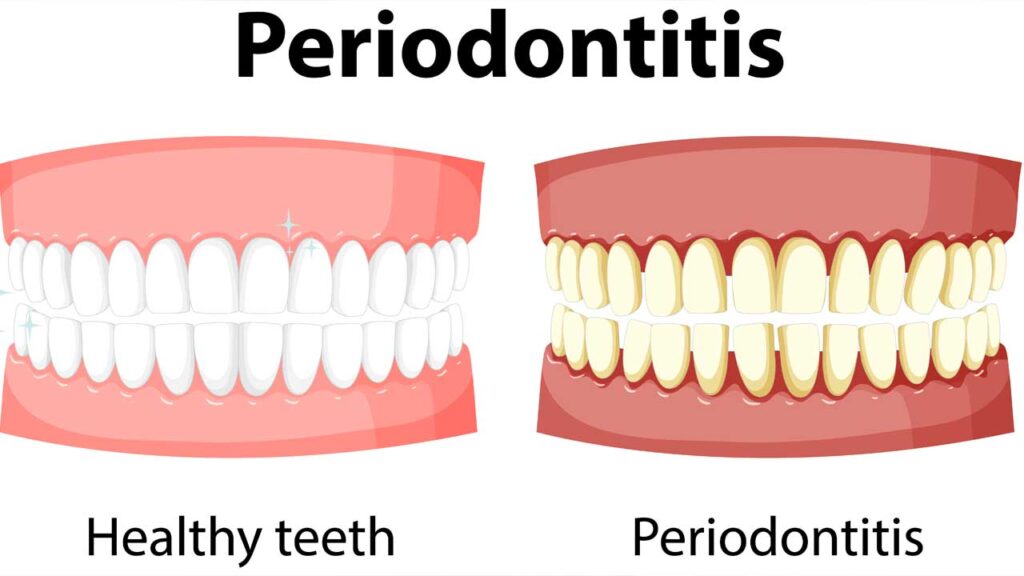Periodontal disease, also known as gum disease, is a common condition that affects the gums and bone supporting the teeth. It is caused by the buildup of plaque and tartar on the teeth, which can lead to inflammation and infection of the gums. According to the Centers for Disease Control and Prevention, half of adults in the United States have some form of periodontal disease.

The importance of diet in preventing and treating periodontal disease cannot be overstated. A healthy diet rich in nutrients that support oral health can help reduce the risk of developing gum disease, while an unhealthy diet high in sugar and processed foods can increase the risk.
What is periodontal disease?
Symptoms:
- Red, swollen, or bleeding gums
- Receding gums
- Loose or shifting teeth
- Persistent bad breath
- A change in the way your teeth fit together when you bite
Causes:
- Plaque buildup on the teeth
- Poor oral hygiene
- Certain medical conditions such as diabetes and HIV
- Smoking or using other tobacco products
Risk factors:
- Age
- Genetics
- Hormonal changes
- Stress
- Poor nutrition
How diet affects periodontal disease
Nutrients that support oral health:
- Vitamin C: helps to maintain the health of the gums and connective tissue
- Vitamin D: essential for the absorption of calcium, which is necessary for healthy teeth and bones
- Calcium: helps to strengthen the teeth and jawbone
- Phosphorus: also helps to strengthen the teeth and jawbone
- Iron: necessary for the production of collagen, which helps to keep the gums healthy
Foods to avoid:
- Sugars and processed foods: these can increase the risk of tooth decay and gum disease
- Acidic foods: can erode the enamel of the teeth
- Alcohol and tobacco: can increase the risk of oral cancer
Recommended diet for preventing and treating periodontal disease:
A diet rich in fruits, vegetables, and lean proteins can help to provide the necessary nutrients for oral health and reduce the risk of gum disease. Foods high in vitamin C, vitamin D, calcium, phosphorus, and iron should be included in the diet. Drinking plenty of water can also help to flush away bacteria and food particles that can contribute to plaque buildup.
healthcareDental health is an important aspect of overall health and well-being. Take control of your dental health with our top-quality dental health care products. Say goodbye to painful and inconvenient dental issues and hello to a brighter, healthier smile.
These products are designed with the latest technology and are made from premium materials, ensuring that you get the best results. Whether you’re looking for a solution for sensitive teeth, gum health, or just want to keep your smile sparkling, our dental health care products have got you covered.
Tired of hiding your smile due to yellowing, stained, or sensitive teeth?
ProDentim is here to help. This advanced formula whitens and strengthens your teeth, while also reducing sensitivity and promoting oral health. Say goodbye to expensive and painful dental treatments, and start enjoying a bright, confident smile with ProDentim.
Click Here to Try ProDentim now and see the results for yourself!
Struggling with tooth sensitivity, gum problems or bad breath?
Dentitox Pro is the solution you need. This natural, effective formula helps to clean and strengthen your teeth and gums, giving you a brighter, healthier smile. Dentitox Pro is made with the finest ingredients and is free from harmful chemicals, making it safe and gentle for everyday use. Say goodbye to pain and embarrassment, and start enjoying a confident, beautiful smile with Dentitox Pro.
Click Here to Order now and get 20% off your first purchase!
Click Here for Professional Teeth Whitening
Frequently Asked Question (FAQ) About Role of Diet in Preventing and Treating Periodontal Disease.
Can certain foods cause periodontal disease?
Consuming a diet high in sugar and processed foods can increase the risk of tooth decay and gum disease.
Are there any specific nutrients that can help prevent periodontal disease?
Vitamin C, vitamin D, calcium, phosphorus, and iron all support oral health and can help to prevent gum disease.
Can a change in diet help treat periodontal disease?
A healthy diet can help to provide the necessary nutrients for oral health and may help to reduce the symptoms of gum disease.
Is there a recommended diet for people with periodontal disease?
A diet rich in fruits, vegetables, and lean proteins can help to provide the necessary nutrients for oral health and reduce the risk of gum disease.
What are some foods that should be avoided if you have periodontal disease?
Sugars and processed foods, acidic foods, alcohol, and tobacco should be avoided if you have periodontal disease.
Periodontal disease is a common condition that affects the gums and bone supporting the teeth. A healthy diet rich in nutrients that support oral health can help reduce the risk of developing gum disease, while an unhealthy diet high in sugar and processed foods can increase the risk.
It is important to include foods high in vitamin C, vitamin D, calcium, phosphorus, and iron in the diet, and to avoid foods that can erode the enamel of the teeth and contribute to plaque buildup. In addition to a healthy diet, maintaining good oral hygiene and avoiding smoking and other tobacco products can also help to prevent and treat periodontal disease.

